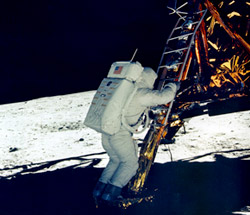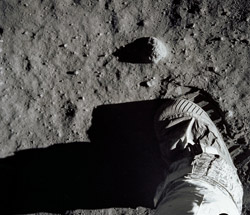
Q. What is the attraction of lunar exploration?


Apollo 11 was the first manned mission to land on the Moon (Courtesy of NASA)
The Moon is a celestial body right beside the Earth, and it's the first thing you notice when walking at night. I'd like to learn about the closest object to the Earth. It's like desire to have a peek into a neighbor's house. I think everyone is curious about the Moon's origin, especially scientists around the world. I'm very interested in the answer too.
Q. Have you had an interest in the Moon since childhood?
No. When I was a graduate student of the University of Tokyo, I was analyzing lunar rocks returned by Apollo astronauts. As the research revealed many new discoveries, I started to get really interested in the Moon. At that time, there were four research groups studying lunar rocks in Japan, and I belonged to one of them. In a way, the Apollo missions changed my life. Previously, my research was on Earth rocks, and I had been interested only in the Earth's interior. But as I got involved in lunar rocks, I thought I would be able to study everything about the Moon, from its birth to the present. Finding out directly about the birth of Earth is almost impossible, but I thought research about the Moon may lead to better understanding of the Earth. This is why the Moon is so exciting. Besides, I wanted to enhance planetary science in Japan by leading the study myself, because there were very few Japanese scientists studying planets and the Moon during the Apollo missions. Lately, departments of Earth and planetary sciences have been instituted at many universities where none had existed before, so, more or less, I have been able to make some contribution to the field.
Q. Would you be interested in going to the Moon?
Of course, I'd love to if I could. There are so many things I'd like to study about the Moon. In my opinion, a negative impact of the Apollo missions is that they gave the public the false impression that there is no more to learn about the Moon, and I think that is why the U.S. Congress hasn't approved human lunar exploration since then. However, the Moon is still full of mysteries, stimulating our desire to pursue them.
Q. Why are humans returning to the Moon now?
Ultimately, it's just because we want to go there. I think it's the same itch you get with a mountain. You want to climb it because it is there, because it's mysterious. I also think that the Moon is something special for us Japanese. Like in the oldest Japanese story, “the Tale of the Bamboo Cutter,” the Moon is so familiar to us. Some Japanese may think that the Moon is romantic, and that this impression will be ruined if it's studied scientifically. I don't think so at all. Scientific knowledge won't change the beauty of the Moon. In fact, the charm of the Moon will be deepened by scientific research. The Moon is a very special recorder of the early history of the solar system. By reading the recorded history on the Moon, we could learn the history of the Earth and other planets before life was formed on Earth. Isn't that thrilling?
Chief Editor of the science magazine Newton
Doctor of Science and Professor Emeritus at the Institute of Space and Astronautical Science (ISAS) of the Japan Aerospace Exploration Agency (JAXA), Prof. Mizutani graduated from the Department of Physics and the Graduate School of Science at the University of Tokyo. He specializes in planetary physics. He was a visiting researcher at the California Institute of Technology and Colorado University, a Professor at the Department of Earth Sciences at Nagoya University, and a Professor and Director of the Department of Planetary Sciences at ISAS. He is also a project scientist for Japan's lunar explorer LUNAR-A. Since leaving JAXA in 2005, he has been the Chief Editor of Japan's prestigious science magazine Newton.
Special Interview
>>Hitoshi Mizutani >>Paul D. Spudis >>Carle Pieters >>Wendell W. Mendell >>Bernard H. Foing
>>Lunar Explorers Around the World